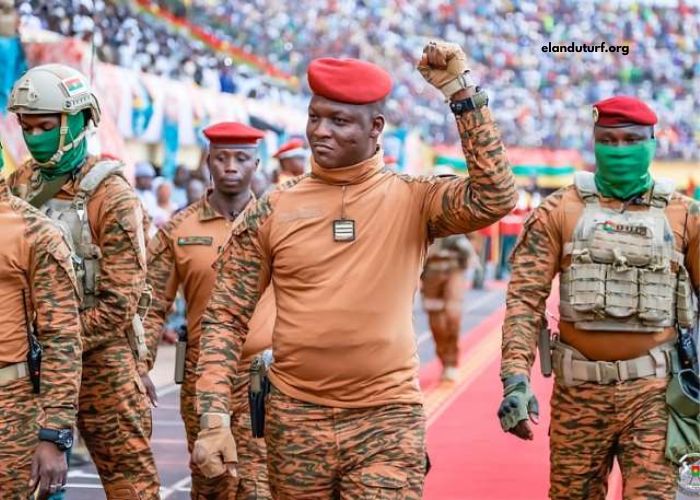Capitaine Ibrahim Traoré has emerged as a key figure in Burkina Faso, known for his leadership in the military and his involvement in recent political events. As a young and dynamic officer, he has played an essential role in the country’s ongoing political transformations. His influence has grown significantly, especially after he became the leader of the military junta, following his involvement in the coup that ousted the previous government. Capitaine Ibrahim Traoré represents a new wave of leadership in Burkina Faso, one that is focused on combating terrorism and stabilizing the country after years of instability.
In recent years, Capitaine Ibrahim Traoré has become the focal point of national discussions due to his role in steering Burkina Faso through some of its most challenging periods. His rise to power marks a significant shift in the political landscape, where military influence has taken center stage. As the country’s political situation continues to evolve, Capitaine Ibrahim Traoré is seen by many as a symbol of strength and a decisive force for change, pushing for national unity and security in a time of crisis.
Who Is Capitaine Ibrahim Traoré?
Capitaine Ibrahim Traoré is a Burkinabé military officer who has gained significant attention for his leadership role in the country’s political and military landscape. He is best known for his involvement in the September 2022 coup that led to the ousting of then-President Roch Marc Christian Kaboré. Following the coup, Capitaine Ibrahim Traoré assumed the position of president of Burkina Faso and has since become a prominent figure in the nation’s quest for stability. His leadership has been marked by his efforts to address the escalating security situation in the country and to provide a new direction for Burkina Faso amidst political turmoil.
Before becoming the leader of Burkina Faso, Capitaine Ibrahim Traoré was known for his service in the country’s military, where he built a reputation as a capable and strategic officer. His military career, combined with his growing political influence, has made him a central figure in the country’s efforts to overcome terrorism and social unrest. Capitaine Ibrahim Traoré‘s leadership is seen by many as an essential turning point for Burkina Faso, offering the promise of a more stable future in a region facing significant challenges.
What Led To Capitaine Ibrahim Traoré’s Rise To Power?
The rise of Capitaine Ibrahim Traoré to power was the result of a complex political situation in Burkina Faso. The country had been facing significant instability due to a rising terrorist threat and dissatisfaction with the previous administration’s handling of security issues. In response to this growing unrest, Capitaine Ibrahim Traoré and other military officers orchestrated a coup in September 2022, which led to the removal of President Roch Marc Christian Kaboré. This marked the beginning of Capitaine Ibrahim Traoré‘s political journey as he assumed leadership, with the mission of addressing the escalating security crisis.
In the aftermath of the coup, Capitaine Ibrahim Traoré quickly consolidated power, positioning himself as a military leader committed to tackling the terrorist threat in the Sahel region. His rise was propelled by his public statements about restoring order and his commitment to fighting extremist groups that were destabilizing the country. Capitaine Ibrahim Traoré’s actions during this period demonstrated his resolve to bring Burkina Faso back from the brink of collapse, making him a key figure in the country’s future political landscape.
What Are the Key Challenges Faced by Capitaine Ibrahim Traoré?
As the leader of Burkina Faso, Capitaine Ibrahim Traoré faces numerous challenges that test his ability to bring stability and security to the country. One of the most pressing challenges is the growing threat of terrorism and insurgency, particularly from groups affiliated with Al-Qaeda and ISIS, which have been operating in the Sahel region. These groups have carried out numerous attacks on civilians, military personnel, and government officials, making security a top priority for Capitaine Ibrahim Traoré and his government.
Another significant challenge is the political instability that has plagued Burkina Faso for years. Capitaine Ibrahim Traoré must navigate the complex political landscape of the country, balancing the interests of the military with the demands of the civilian population. His leadership is also under constant scrutiny from both domestic and international observers, who are watching to see how he handles the country’s transition back to civilian rule and the restoration of democratic institutions. For Capitaine Ibrahim Traoré, the task is monumental—creating a stable government while addressing the pressing security challenges.
How Is Capitaine Ibrahim Traoré Working To Address Security Issues?
Capitaine Ibrahim Traoré has made addressing the security challenges in Burkina Faso a central aspect of his leadership. His government has been focused on combating the insurgent groups that have destabilized the country, particularly in the northern and eastern regions. To address this, Capitaine Ibrahim Traoré has prioritized the strengthening of Burkina Faso’s military capabilities, increasing coordination with regional partners, and mobilizing resources to combat terrorist groups.
Additionally, Capitaine Ibrahim Traoré has called for international support in the fight against terrorism, seeking assistance from neighboring countries and international organizations to help address the growing security crisis. He has also worked to maintain morale within the military, ensuring that the armed forces are adequately equipped and motivated to confront the challenges posed by armed extremist groups. For Capitaine Ibrahim Traoré, achieving peace and stability is a matter of national survival, and he has made it clear that the military’s role in securing the country will be central to his strategy moving forward.
What Are the Long-Term Goals of Capitaine Ibrahim Traoré?
Looking toward the future, Capitaine Ibrahim Traoré has outlined several long-term goals for the country, focusing on restoring security and national unity. One of his key objectives is to ensure the defeat of extremist groups in the Sahel region, which have made significant inroads into Burkina Faso’s territory. Achieving this goal will require a comprehensive approach that includes military action, as well as socio-economic development programs aimed at addressing the root causes of radicalization.
Another long-term goal for Capitaine Ibrahim Traoré is the stabilization of Burkina Faso’s political system. Although he currently heads a military government, he has emphasized the importance of eventually transitioning to a civilian-led government, in line with the country’s democratic aspirations. However, Capitaine Ibrahim Traoré has made it clear that this transition can only happen once security is restored, and the country is no longer under the threat of destabilization from terrorist groups.
How Has the International Community Responded to Capitaine Ibrahim Traoré?
The international community has had a mixed response to Capitaine Ibrahim Traoré‘s rise to power in Burkina Faso. While some countries and organizations have expressed concerns about the military coup and the potential erosion of democratic institutions, others have acknowledged the gravity of the security situation in Burkina Faso and the Sahel region. Many international actors have focused on the need for a comprehensive strategy to combat terrorism, and some have shown support for Capitaine Ibrahim Traoré‘s efforts to secure the country and restore order.
The response from the African Union and the Economic Community of West African States (ECOWAS) has been cautious, with both organizations urging Burkina Faso’s military leaders to prioritize a return to constitutional rule. However, Capitaine Ibrahim Traoré has emphasized that national security and sovereignty must be the priority, and he has asked for international support in fighting the extremist groups that threaten the stability of Burkina Faso. The international community’s response to his leadership will likely depend on the success of his efforts to stabilize the country and ensure the safety of its citizens.
Conclusion
In conclusion, Capitaine Ibrahim Traoré has become a central figure in Burkina Faso’s struggle for stability amidst ongoing security challenges. His rise to power, marked by a military coup, has positioned him as a leader committed to securing the country and addressing the complex issues facing the nation.
His focus on combating terrorism and restoring national unity has gained significant attention both domestically and internationally. While the future remains uncertain, Capitaine Ibrahim Traoré‘s leadership will likely play a pivotal role in shaping the political and security landscape of Burkina Faso in the years to come.







